A variety of treatment modalities are used as therapy adjunct to help our clients meet their needs. A tailored rehabilitation package is identified for each client following a detailed assessment and careful consideration of the client’s goals
Therapy is directed using land based treatment, hydrotherapy or rebound therapy alongside use of technology and equipment

Medico Legal Expertise
We are instructed by case managers and solicitors for assessment, recommendations, detailed report and to formulate client-centered goal setting, a treatment plan for individuals with brain injury. We are instructed as treating therapists or medico-legal expert witnesses.
Full Process
- Upon receiving instructions, based on the client’s condition and nature of the difficulty, one of our specialist physiotherapists will complete a detailed assessment.
- A detailed bespoke report and costings are produced, highlighting the client’s areas of difficulty, goals, and therapeutic approach.
- Treatment reports are formulated after a comprehensive assessment of the client, evidence of impact of injuries, and its long term implications for the client.
- We provide detailed equipment assessment to include innovative technology and specialist splinting and costings.
- Once the funding is approved, we will commence treatment targeting our client’s goals and bespoke approach to improve their abilities.
- Treatment is carried out in the community, at the client’s home, school, college, daycare centers, leisure centers, gym, pool, etc.
- We are involved in training and supervising support staff and carers on physiotherapeutic approaches, postural management, and handling schedule for our client.
- We will complete a detailed risk assessment and guidelines for the use of specialist equipment, hydrotherapy or rebound therapy.
- We aim to integrate our clients well within the community using leisure and sports activities, promoting social skills and confidence.
- We offer periodic updated goals and review reports as per our client’s progress and give our professional input in multidisciplinary team meetings.
Treatment Approach
We use vestibular rehabilitation techniques, Sensory Integration, and Bobath approaches. Our personalised physiotherapy programs are entirely client and family-focused. They are designed to be incorporated into the client’s daily routine at home, school, college, gym, work, play, social, and routine physical activities. Our treatment approaches are evidence-based and are supported with references from independent clinical trials. We use objective goal setting specific to each client and use a wide range of assessment tools to evaluate the client’s progress. Uses of measurement tools make treatment goals specific and achievable.
Neurological Gait Analysis and Advice on Orthotic Management
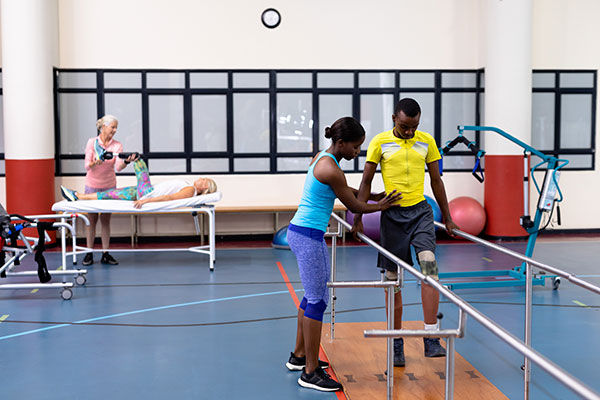
Most of the disabling conditions like cerebral palsy, acquired brain injury, stroke, peripheral neuropathies have associated gait pathology resulting in standing and walking difficulties. We offer a biomechanical assessment to review forces, movements, and power, undertake gait analysis and orthotic assessments to understand the biomechanical alignment, and help assess for ankle-foot orthosis (splints) and footwear combination. We work closely with an established network of clinical orthotists to offer this comprehensive care to our clients.
Neurological Gait Analysis and Advice on Orthotic Management

Most of the disabling conditions like cerebral palsy, acquired brain injury, stroke, peripheral neuropathies have associated gait pathology resulting in standing and walking difficulties. We offer a biomechanical assessment to review forces, movements, and power, undertake gait analysis and orthotic assessments to understand the biomechanical alignment, and help assess for ankle-foot orthosis (splints) and footwear combination. We work closely with an established network of clinical orthotists to offer this comprehensive care to our clients.
Hydrotherapy/ Aquatic Therapy
Hydro therapy is derived from the Greek work “hydro”- water and “Therapia”- healing, also called aquatic therapy. Physiotherapy programs utilising properties of water are widely used with clients having neurological and musculoskeletal conditions. It is much easier to initiate movements in water and exercise can be effortless and fun. We use hydrotherapy as an adjunct to help our clients achieve their goals. We are trained to work with children and adults with complex physical needs and maximize their potential in a pool environment.
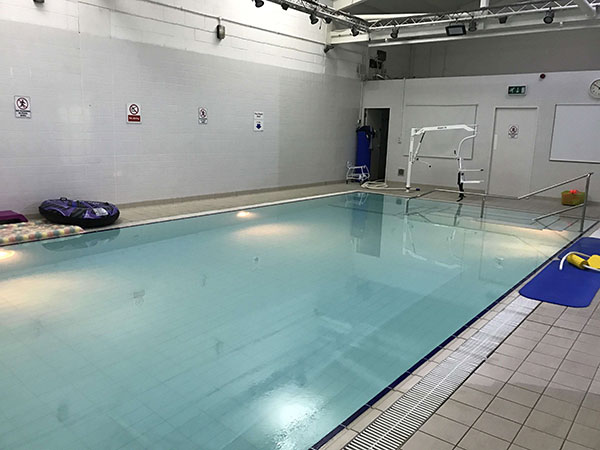
Hydrotherapy/ Aquatic Therapy
Hydro therapy is derived from the Greek work “hydro”- water and “Therapia”- healing, also called aquatic therapy. Physiotherapy programs utilising properties of water are widely used with clients having neurological and musculoskeletal conditions. It is much easier to initiate movements in water and exercise can be effortless and fun. We use hydrotherapy as an adjunct to help our clients achieve their goals. We are trained to work with children and adults with complex physical needs and maximize their potential in a pool environment.

Personal Training and Sports Therapy
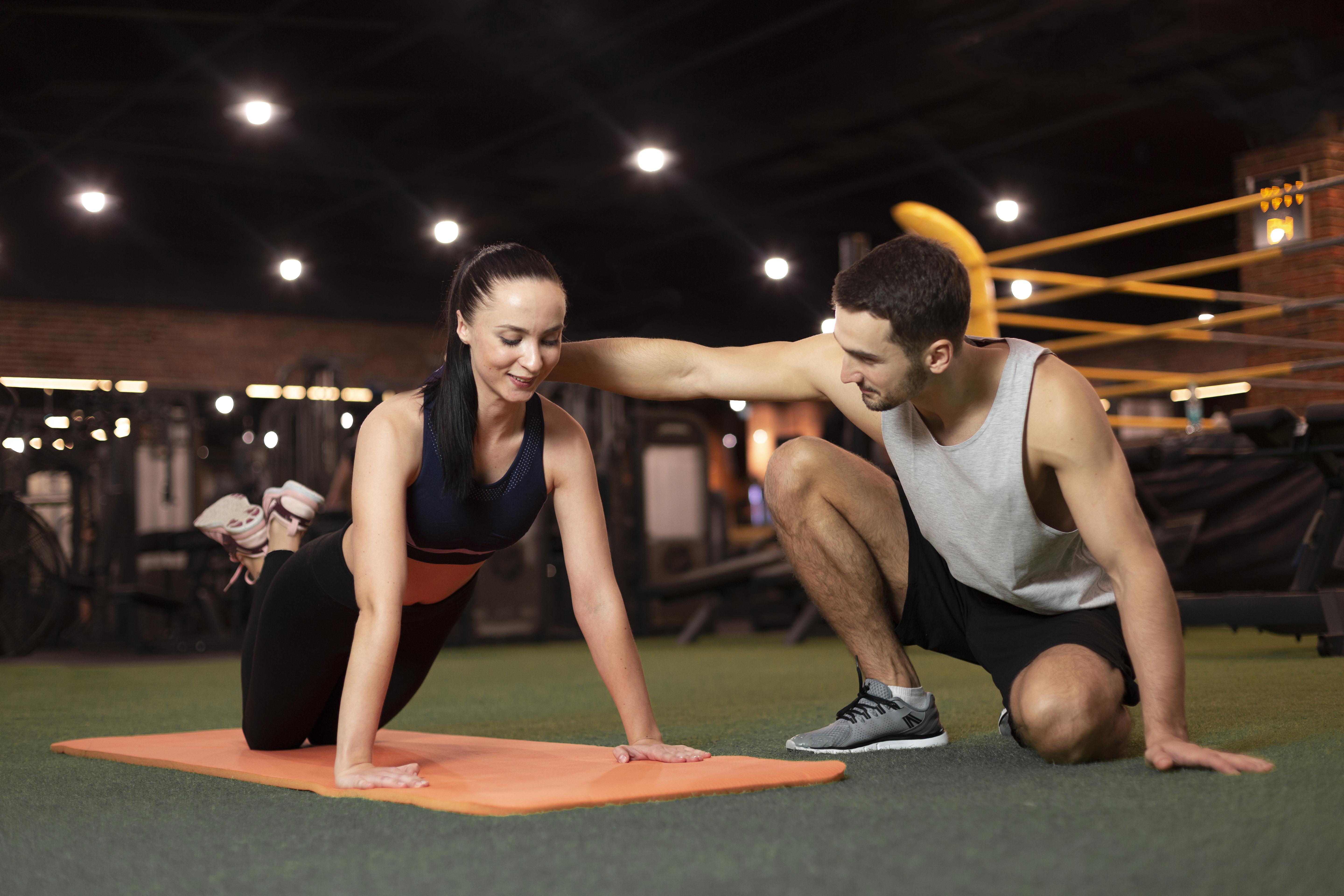
Our personal trainers work alongside experienced physiotherapists to create client specific bespoke fitness programmes, motivating and guiding our clients through the process of recovery. Whether the goal is to gain strength, limit muscle atrophy, learn desirable movement pattern, functional training or weight management, our personal trainers will work closely with you to enable you achieve those targets with a high standard evidence based practice. All targets and clinical goals are devised under the supervision of an experienced physiotherapist and will be delivered by our personal trainers.
Personal trainers would also conduct a variety of assessments beginning with a preparticipation health-screening and will include assessments of posture and movement, flexibility, balance, core function, cardiorespiratory fitness, muscular fitness, body composition, and skill-related parameters like power, agility, and coordination. Our personal trainers are certified and experienced working with clients with complex needs and they work closely with our neurological physiotherapy team to maximise client’s potential.
Read More
Following a physiotherapy assessment if it is identified that the client has had a period of inactivity and are de-conditioned following their injury or when client’s progress has hit a plateau, a goal centre approach will most certainly heighten the process of recovery and role of a personal trainer is invaluable at this point.
Your personal trainer will enable you to:
• Improve motivation and accountability
• Access hands on treatment plan
• Facilitate correct technique, form and inhibit compensatory patterns
• To reach your fitness goals
• Access fitness tests to track improvements
• Improve participation within the gym set up
• Familiarise with equipment in the gym
• Maximise your workout gains
• Create bespoke fitness plan
• Empower you to achieve and excel your fitness goal
To book an initial consultation with Harry Davies, personal trainer and our experienced physiotherapy team, contact us here
Rebound Therapy
Rebound Therapy is used to facilitate movement, promote balance, influence muscle tone, promote sensory feedback, improve fitness and exercise tolerance and to facilitate relaxation. The principles of Rebound Therapy form the basis of gymnastic movements. It teaches progressions of movement patterns which are designed to encourage the child to experience healthy exercise while having fun. Rebound therapy is widely used in children and adults with various levels of functional difficulties. Please ask your therapist if your child or yourself are suitable for an assessment.
Postural Care
Children and adults with physical difficulties need 24 hours postural care in sitting, lying, standing and walking. We offer specialist assessment and recommendations for a wide range of therapy equipment like standing frame, walking frame, sleep systems, TRIKES, mobility and transfer aids. We use wide variety of postural management equipment that work in adjunct with ongoing therapeutic programme.
Saebo Splinting
Children and adults with physical difficulties need 24 hours postural care in sitting, lying, standing and walking. We offer specialist assessment and recommendations for a wide range of therapy equipment like standing frame, walking frame, sleep systems, TRIKES, mobility and transfer aids. We use wide variety of postural management equipment that work in adjunct with ongoing therapeutic programme.
Standardized Assessment
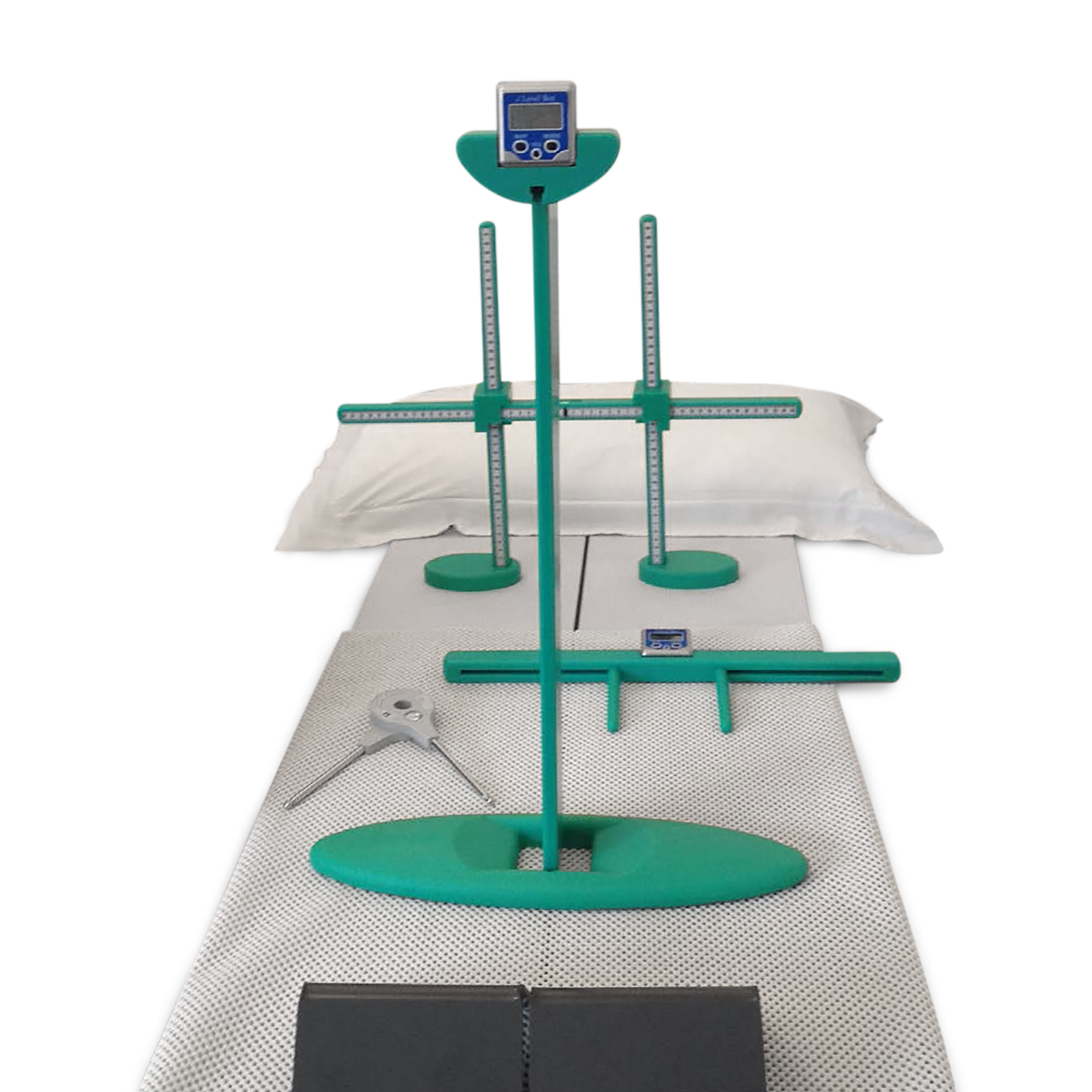
Standardised assessments are formal assessments that are designed to measure a client’s abilities compared to their age equivalent peer group. These tests have been normed on a large population, which means that they have been administered to thousands of clients of varying abilities to determine the average level of ability. Standardised assessments are administered in a standard way to ensure that they provide the same instructions for each client.
In addition to the standard score, client’s results might be reported in terms of their percentile rank. This is another way of explaining where their score sits in comparison to other age equivalent peer group.
Standardised assessments give a clear score that can be used to give a picture of where a client sits in comparison to the similar aged population. The information helps to formulate a therapy plan and informs the wider multidisciplinary team working around client about their specific target goals. The scores can also be used as a baseline for therapy, and tests are generally readministered following an intervention to assess progress.
We Use a Range of Standardised Assessments
1. Goldsmith Body Symmetry Assessment
Goldsmith measurements are used in children, young people, and adults at risk of body shape distortion. The measures are standardised and relate only to Procedures 1, 2, and 3 for use with Anatomical Measuring Instrument (AMI) with Level Box Angle Sensor as Accessories.
Purpose of Assessment
AMI is a complete postural care management solution; it gives easy access to anyone working with a client that needs postural care information and data regarding their posture and management using appropriate support.
It is the only validated tool to measure 3D chest shape changes and hip wind sweeping and is supported by NICE guidelines. The assessment offers targeted treatment based on objective measures/findings. This involves engaging the family and care team around the child and visual understanding of the family and care team.
The assessment allows preventive treatment through early intervention and we are able to detect bodily changes and set out early intervention plan with appropriate use of equipment that is likely to limit further deterioration and prevent future surgeries. The procedure is accessible and is client centred.
The objectives reinforce positive behavioural changes in clients and there is data efficacy on individuals and service providers. Protecting body shape helps gain better health outcomes, which in turn affects the quality of life and improve life expectancy.
2. BOT 2 Bruininks- Oseretsky Test of Motor Proficiency
BOT measures a wide array of fine motor and gross motor control skills in individual ages 4 through 21
3. The Gross Motor Function Measure (GMFM)
GMFM is an assessment tool designed and evaluated to measure changes in gross motor function over time or with intervention in children with cerebral palsy. Items span the spectrum of gross motor activities in five dimensions.
A: Lying and Rolling,
B: Sitting,
C: Crawling and Kneeling,
D: Standing, and
E: Walking, Running and Jumping
4. Functional Gait Assessment (FGA)
FGA is used to asses postural stability during walking and assess an individual’s ability to perform multiple motor tasks while walking. The tool is a modification of 8- item dynamic gait index developed to improve reliability.
5. Activity Specific Balance Confidence (ABC) Scale
ABC scale is a self-reported measure of balance confidence in performing various activities and accounts for feeling of unsteadiness and loss of balance in activities of daily living. The test assess for vestibular, non vestibular balance and functional mobility.
Assessment and Treatment with (FES)
Functional electrical stimulation is a therapy method where nerves are stimulated with electrical current via surface electrodes. The technique produces contractions in paralysed muscles by application of small pulses of electrical stimulation to nerves that supply the paralysed muscle. Stimulation may be applied using skin surface electrodes or using an implanted device.
Read More
Functional Electrical Stimulation (FES)
Can enable muscles to be trained even when some or all voluntary control of them have been lost. Besides preventing muscular atrophy and wasting, the treatment induces muscle relaxation, increases blood circulation, activates muscle function and improve joint range of motion.
FES can be used in cases of cerebral palsy, head injury, upper motor neuron lesion, complete or incomplete paralysis following spinal injuries. Functional electrical stimulation is also widely used for gait training in children or adults with foot drop. FES has several benefits over ankle foot orthosis (ankle splints). This is an active intervention that enables the client to use of their own muscles. Active contractions are produced, which help with muscle retraining, possibly leading to strengthening and is likely to facilitate voluntary control through motor learning.
Audits of clinical service and surveys indicate reduced effort of walking, reduced tripping, and improved confidence while walking. People using FES for treatment report greater mobility and improvement in activities of daily living than the control group receiving only physiotherapy treatment.
FES Cycling
FES cycling enables active arm or leg training in clients that have impaired muscle activity as a result of complete or incomplete paralysis. RehaMove FES cycling is used for clients with impaired mobility in their bed or actively from their therapy chairs. The FES movement training aids muscle activation with high intensity training, promote cardio metabolic training, improves flexibility offering passive movements to paralysed muscles and helps build up muscle strength and heightens functional gain.
RehaMove sequence training mode offers the stimulation of various functional movements using common applications eg, FES walking and gait training, sit to stand transitions, shoulder stabilisation and other forms of functional training.

Elastic Therapeutic Taping
Used to facilitate activity in skin (dermis and epidermis) that could facilitated or inhibit muscle activity and particular movement pattern. This treatment approach is used in neurological, orthopaedic, musculoskeletal or in lymph flow disorders. Taping is used either on muscle belly, myofascial chains, cutaneous and trigger points, fascial sheets or on dermatomes. We use this treatment as an adjunct to influence muscle function and train on typical movement patterns. The treatment is highly evidence based and help clients with neurological or underlying orthopaedic problems to achieve their targeted goals and objectives.
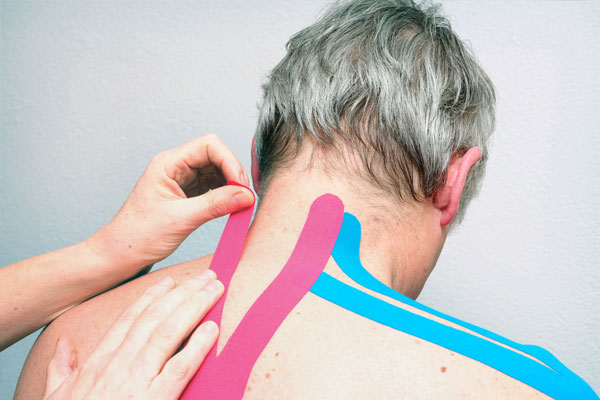
Elastic Therapeutic Taping
Used to facilitate activity in skin (dermis and epidermis) that could facilitated or inhibit muscle activity and particular movement pattern. This treatment approach is used in neurological, orthopaedic, musculoskeletal or in lymph flow disorders. Taping is used either on muscle belly, myofascial chains, cutaneous and trigger points, fascial sheets or on dermatomes. We use this treatment as an adjunct to influence muscle function and train on typical movement patterns. The treatment is highly evidence based and help clients with neurological or underlying orthopaedic problems to achieve their targeted goals and objectives.